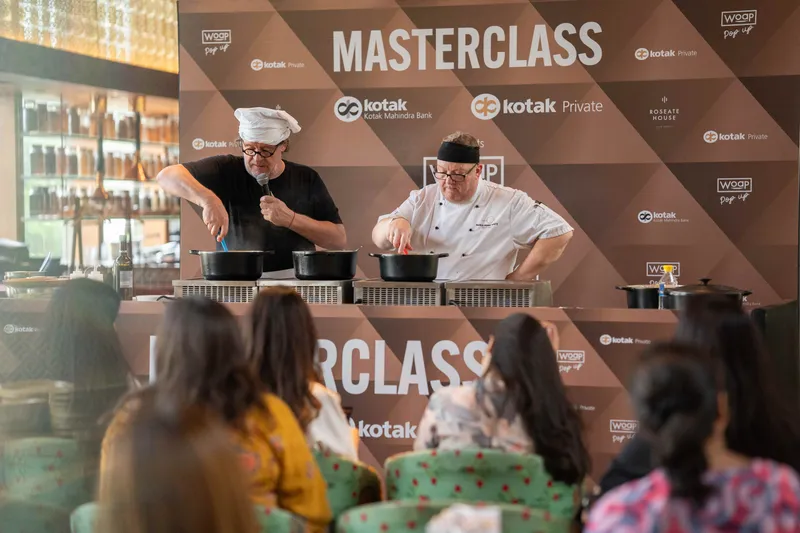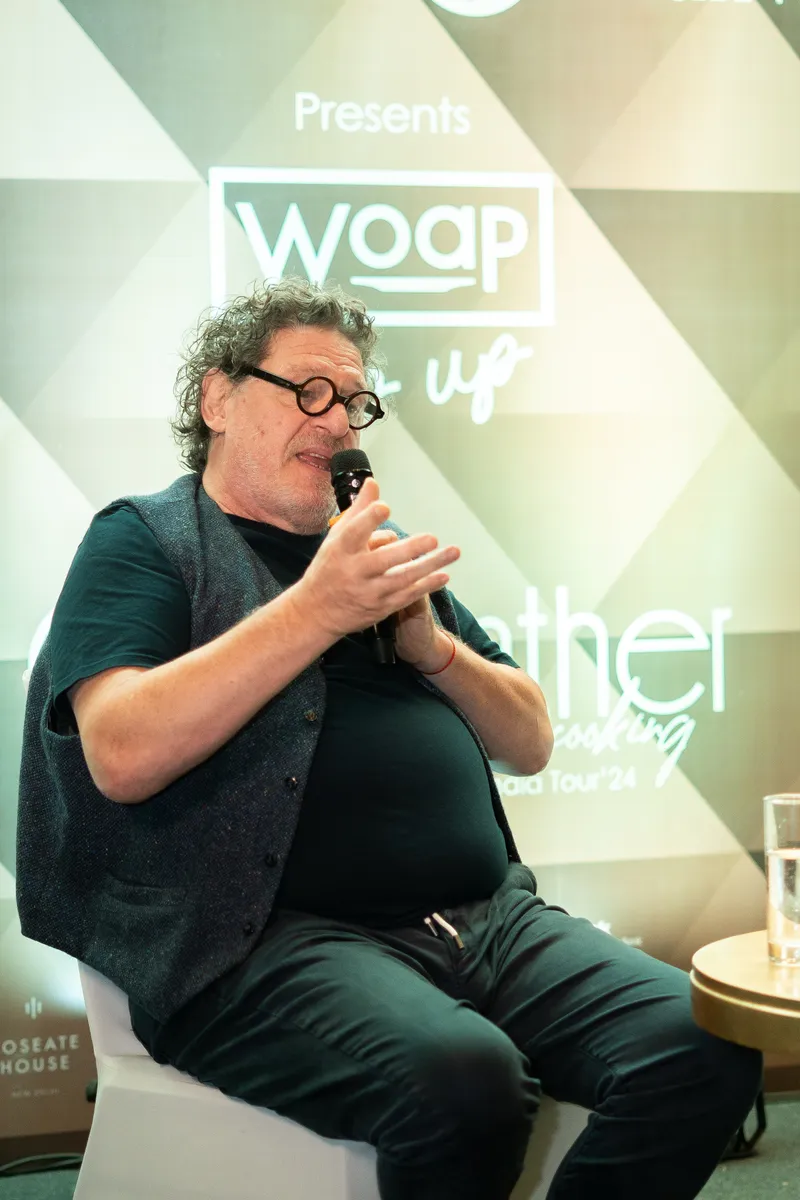Marco Pierre White, the godfather of modern cooking, on his love for Indian food
Celebrity chef Marco Pierre White confesses his obsession with Indian food, calling it one of the great cuisines of the world.
It’s a typical September evening in Delhi. Intermittent spells of rain lash the city, turning the weather more muggy than breezy. Internally, there’s a storm brewing within me. I am equal parts nervous and excited to meet celebrated British chef and restaurateur Marco Pierre White or MPW, often referred to as the ‘godfather of modern cooking,’ at Roseate House New Delhi.
White has been in India for two weeks, touring Mumbai and Bengaluru before arriving in Delhi. His itinerary is packed with a series of masterclasses and dinners, as part of a collaboration between Kotak Private and World On A Plate, Asia’s largest gourmet community.
When I enter the meeting room where he’s waiting for me, I brace myself for some intimidating moments. But, to my surprise, White is genial and warm.
“Would you like some filter coffee?” he asks. As I nod my head in approval, I can see the delight on his face. “It reminds me of chicory,” he adds.
Within a few minutes, White is waxing eloquent about India and its food. He makes his love for biryani evident at every opportunity he gets.

Celebrity chef Marco Pierre White during the masterclass
“I’ve only had it one way, mutton with bones, in Bengaluru, Delhi and Mumbai. You wouldn’t believe it, but I had it three days on the bounce, prepared by the same chef in Mumbai. On the third day, he came to me with five pieces of mutton. He’s my best friend,” he laughs.
“Oh and I love sucking the marrow out of the bone,” he adds.
He’s also a fan of butter chicken, much like many around the world. And he doesn’t stop there—he tells me that black dal is divine.
Jason Everett, his executive chef at Black and White Hospitality, seated beside White, smiles.
Looking at Everett, White says, “I introduced him to black dal and he kept digging into it. It’s magic. The reason I love Indian cuisine is because… a life without calories is not a life, and I know this food has lots of calories.”
Funnily, White admits he confused the price of the food on the menu with calories.
“Every time I go back to England from India, I go back larger than I arrived. Indian cuisine forces you to indulge. You can’t stop. It’s addictive like the country,” says White, who once ran Harveys, one of England’s most iconic restaurants.
Gushing over Indian cuisine
With our conversation predominantly focused on Indian food, I recommend a visit to Amritsar, famed for its culinary delights, the next time he’s in India.
He makes a mental note of my suggestion and continues, “You know Indian cuisine is without question one of the great cuisines of the world. Sadly, it hasn’t been given the recognition it deserves. No one in this world has an understanding of spice like the Indians. You never see them using scales, they use their fingers and cook food very slowly.”
Pointing out that Indian cuisine is not designed to be served in small portions, he says, “It’s designed to be served generously. I also believe it’s the most humble cuisine in the world.”
The chef’s candid demeanour is refreshing. He doesn’t mince words even once during our hour-long conversation.

Celebrity chef Marco Pierre White
“Indian cuisine is one for the people. There’s no snobbery in it, unlike some other cuisines in the world. Food is what brings us all down to earth is what I believe,” he shares.
When I ask him about his favourite restaurant in India, he’s quick to answer, “It’s Trishna in Mumbai all the way. The fish is cooked to perfection. But to be honest, I’ve never had a bad Indian meal in India.”
White is also highly impressed by the quality and service of food at The Leela Palace Bengaluru, calling it the “best room service” he’s ever been given in life.
He particularly appreciates the sensory experience the service provided.
“I have travelled the world and stayed in five-star hotels everywhere. I tend to eat in my room. The food arrived hot. It was served the way it should be, in beautiful silverware. When the servers lifted the lid, it looked appealing and had a heady aroma. Before you even eat it, you are being seduced by it.”
“Indian cuisine is one of the rare cuisines that can be served well in a room on the 10th floor. It carries well. That’s why I say it’s the best takeaway food in the world, followed by Cantonese and Lebanese food,” reiterates White.
Makings of a good chef
From Indian food, our conversation moves to the pressure on restaurants to perform. In a world brimming with new ideas and concepts, the chase to earn the coveted Michelin star can sometimes be maddening.
White, on the other hand, hung up his apron at the peak of his career and returned his three Michelin stars in 1999, earning himself the sobriquet enfant terrible meaning ‘terrible child’.
“The Michelin star is perfect for the superficial world, it’s a brand. I go back nearly 50 years in the industry, so I’ve seen a lot. Remember what the Michelin guide was? In 1900, André Michelin created a guide for the people who bought his tyres. When I was a boy, it was essentially a service,” he says.
When White started cooking, he recalls, there were four restaurants with two Michelin stars and maybe 10 with a single star in Britain.
“It (Britain) was a gastronomic desert at one point. Earlier, it would take eight to nine years to earn three Michelin stars. Well, things have clearly changed,” he states.
But does this recognition make someone a great cook? In his opinion, there are only three things that matter.
“They (cooks) must accept and respect Mother Nature as the artist. Everything that they do is an extension of them as a person, and third, and most important, they give you insight into the world they were born into. That’s what India does every day of the week.”
It’s clear that White believes in simple principles and refrains from making things complex. His food reflects the same thought, and so does his lifestyle.
Who would imagine that one of the most legendary restaurateurs and television personalities in the world carries an old-style Nokia keypad phone even today?
“I like simplicity. I don’t like to unnecessarily mix things. Fusion is confusion. I like one-pot cuisine, it has more flavour than the pan. I like braised food, I like things that take time. I like things that slowly break down,” says one of the most prolific restaurateurs in the world, whose proteges include Gordon Ramsay, Heston Blumenthal, and Robert Reid.
This approach could be attributed to his early years being around his mother in the kitchen. While White lost her to brain haemorrhage when he was only six years old, her lessons have stayed with him.
“She was a great cook. An Italian, she was taught by her mother. I think I started as an apprentice cook when I was three… sitting on the side, watching my mother make risotto or pasta or mincing the meat,” he recalls.
“My childhood was also about being close to nature. Plucking peaches or cherries and eating them—there was an explosion of warmth seducing my mouth. Catching great fish was also something I remember,” says White.
While many say cooking is science, he begs to differ. For him, it’s a philosophy. “It’s not a recipe unless it’s pastry. Pastry is chemistry, it is science,” he educates.
As we inch towards the end of our conversation, White, who has been patiently satiating my curiosity about life and everything else, smiles and remarks, “You have a large appetite, don’t you?”
Before I can answer, he says, “I like it,” and begins discussing his menu for dinner with Everett.
Edited by Swetha Kannan







